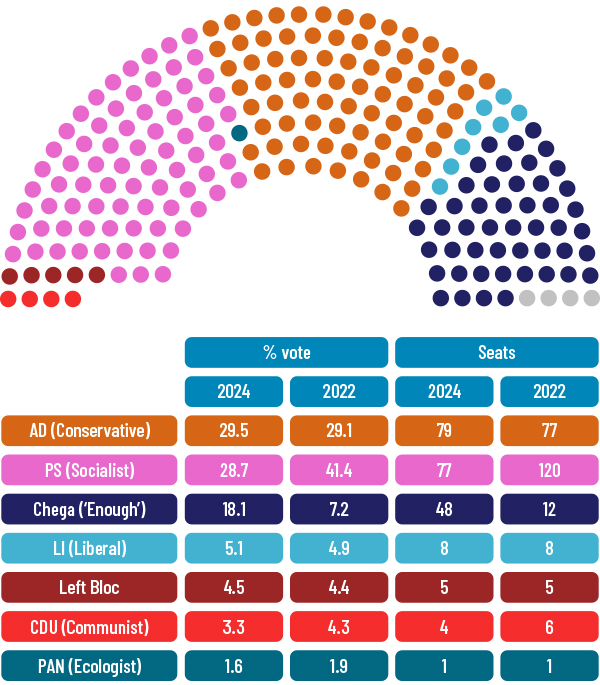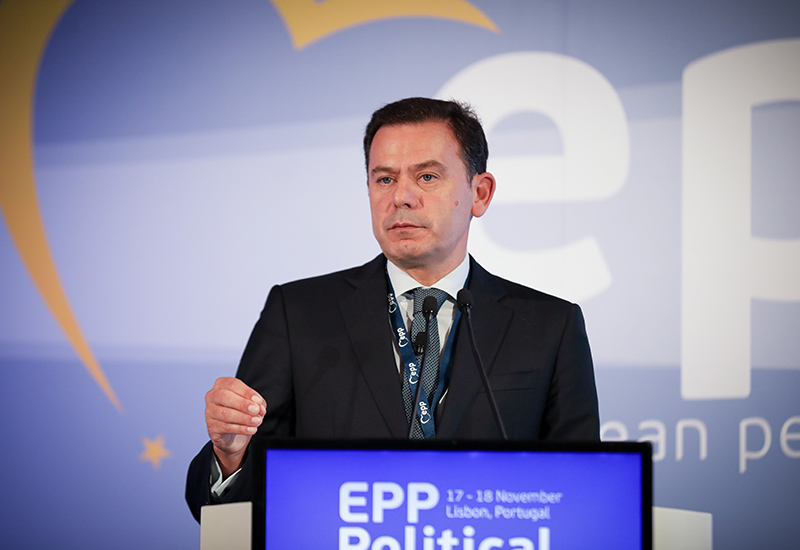Portugal’s general election, held on 10 March, has produced losers but no obvious winner regarding who now governs the country and on what terms. Eight years of domination by the Socialist Party have come to an end. The populist right has surged in support. But what sort of government does the country now get?
The Socialists are the big losers. This almost certainly reflects the corruption allegations that were swirling around Antonio Costa’s government and which led to its early downfall, only two years after the previous election.
The main opposition, the conservative AD (PPD/PSD, CDS-PP and PPM coalition), failed to capitalise on the Socialists’ unpopularity. They ended up with broadly the same level of support they had two years ago when they were soundly defeated by the Socialists. This time, however, that same level of support has left them just ahead in terms of seats.
The populist right-wing Chega – founded only three years ago and led by former TV commentator Andre Ventura – has made dramatic progress, calling for Portugal to be ‘cleaned up’.
In the 230-member National Assembly, 116 seats are required to form a majority. No party is close. Therefore, the election will be followed by negotiations to determine what sort of government can be assembled.
In summary, the election results are as follows, showing changes from the previous poll:

What are the options?
A right-wing coalition. The Conservatives and Chega could command a majority together. However, AD and PSD leader Luis Montenegro has repeatedly ruled out bringing Chega into government. He and Ventura were abusive about each other during the election campaign.
Furthermore, Portugal’s President, Marcelo Rebelo de Sousa, despite his constitutional obligation of neutrality, said during the campaign that he would prevent Chega from taking office.
A AD minority government. This alliance could only work if Chega agreed to support it without joining it, and there would undoubtedly be a heavy price for that. It could also work if the Socialists agreed not to vote against the government on crucial matters, such as the budget. Either arrangement would be inherently unstable.
A ‘grand coalition’. An arrangement between the two main parties either to enter government together, or to allow the other to do so on an alternating basis. There is no precedent for this in the post-1974 Republic. There could be strong public objection, especially to seeing the Socialists continue in office in any form after such a clear public rejection. Chega – loathed by both – could be the principal beneficiary of such an arrangement, as it would become the only effective alternative.
Another election. If negotiations end in deadlock or if a new government immediately runs into trouble with votes in the Assembly, either the parties, the President of the Republic, or both could call for a fresh election. The risk would be a very similar result, leaving the political deadlock firmly in place.
The election has produced the most problematic result the country has seen since the Republic came into being after the 1974 revolution. Fifty years of smooth oscillation between centre-right or centre-left coalitions has come to an end. Portugal’s political leaders have been given the formidable challenge of now making the public’s choice work – somehow.
James Plaskitt is a retired politician who was a member of the British Parliament from 1997 until 2010. He now lives in the Algarve.
Main image: Luis Montenegro, leader of AD coalition and PSD © European People’s Party













